The Covid-19 pandemic and persistent economic uncertainty have not dented Luxembourg’s continuing growth as a centre for alternative investments, especially private equity, real estate and private debt, according to speakers at ALFI‘s PE & RE Conference 2020. The capital needs of the economic recovery are likely to give the sector a further boost in the coming months and years, while industry members point to its early commitment to sustainability and reduction of carbon emissions. Meanwhile the range of activities carried out in Luxembourg is growing in response to substance requirements – but also the jurisdiction’s deep pool of fund services expertise. Here’s a report we put together as media partners for ALFI‘s event.

Industry celebrates Luxembourg’s expanding role as alternatives hub
The economic and social disruption stemming from the Covid-19 pandemic has done little to slow the growth of Luxembourg as a hub for international alternative investment business, according to speakers at ALFI’s – virtual – annual PE & RE Conference on December 1 and 2.
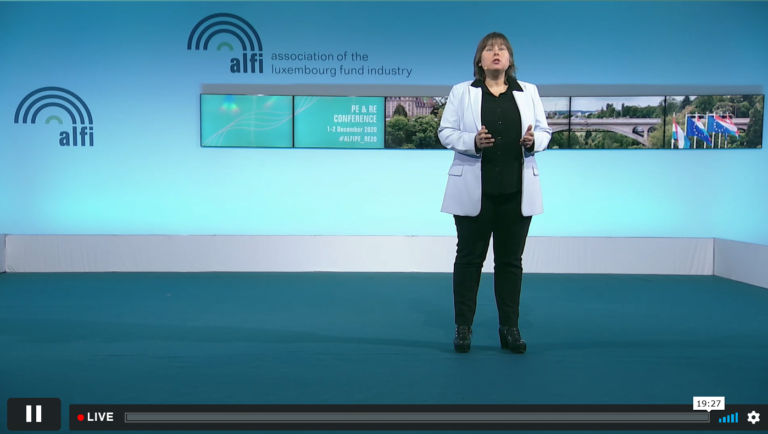
The 500 registered attendees heard ALFI chairperson Corinne Lamesch underline the importance of private equity and real estate to the grand duchy’s financial sector and to the fund industry as a whole in an environment that has if anything boosted demand for private assets. She cited a forecast by specialist data provider Preqin that global alternative fund assets are forecast to reach $14 trillion by 2025, with private equity accounting for $4.9trn, private debt for $1.4trn and real estate for $1.2trn.
“Regulated alternative funds in Luxembourg reached €800bn at the end of September, 17% of total fund assets – but this does not include the asset volume in unregulated funds, for which statistics are difficult to compile,” Lamesch said. A measure of the sector’s impact is the 1,160 reserved alternative investment funds launched since the regime was introduced in 2016, along with 4,320 special limited partnerships, a structure added to the Luxembourg fund toolbox in 2013.
She added: “The pandemic has impacted fundraising and short-term performance, but players are confident, if not bullish, about the long term, especially by comparison with other investment strategies – especially with initiatives underway to open alternative investments to a wider investor base.”
Economic headwinds
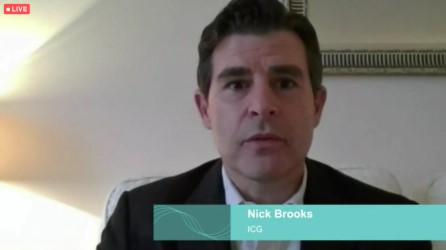
The industry must live with economic headwinds for a few months yet, thanks to the second wave of infection in Europe and the US, according to Nick Brooks, chief economist of London-based private debt, credit and equity manager Intermediate Capital Group. But he said: “We should be moving in the direction of normalcy by the second quarter of 2021 and see a recovery powered by pent-up demand in the second half of the year.”
Brooks argues that private capital has a key role to play in the economic rebound, with a great deal of dry powder available for investment, just as governments are obliged to start cutting back measures to support jobs and businesses at a massive cost as a proportion of GDP. “Many companies have only survived through government-backed loans and direct funding, and there will be great demand for capital later this year,” he said.
The fast-growing private debt market stands to be a prime beneficiary, says Alfonso Erhardt, founding partner of Madrid-based Oquendo Capital. “There has been a huge correction and many business models have been impacted, with sectors such as tourism and airlines particularly suffering.” Not many borrowers have sought renegotiation of terms, he says, but there have been more requests for additional liquidity, and Oquendo has urged firms to take as much state assistance as possible.
Giorgio Medda, group co-CEO at Italy’s Azimut Private Debt, says sustainability issues are increasingly central to the industry. “We benefit from the luxury of being able to cherry-pick business, but private markets are more efficient in implementing ESG considerations,” he said. “We provide a high degree of support to the economy, working with borrowers on sustainable business plans, which comes very naturally to ESG investors.”
Plugged into the data flow
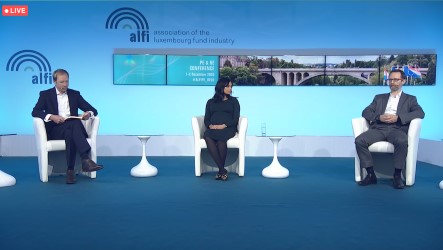
Director Sara Huda says the collection and use of data is an increasingly important issue for Carlyle, which now has 40 staff in Luxembourg and over the past five years has seen SPV numbers in the grand duchy grow from 80 to 400 and assets from €5 billion to €20 billion. “We have consolidated data from our portfolio companies in a centralised function, which means Luxembourg is now plugged into the data flow. It is no longer a pure back office; data is not just being collected but interpreted here.”
Her appreciation of the advantages of the jurisdiction is echoed by Thomas Healy, chief operating officer of Swiss asset manager Kieger, which has been managing Luxembourg-domiciled funds since 2009: “Its proximity, language and culture make it ideal to target a continental European investor base. Luxembourg has a strong reputation and robust regulation, but also flexibility and the presence of global service providers. At Kieger, we also take governance and risk management very seriously.”
He also praises the CSSF and service providers for their responsiveness when the firm was merging a group of FCPs with UCITS earlier this year and moving a range of 20 funds to a new depositary and administrator: “We expected delay with these complex processes, but in fact hit all the deadlines.”
Martin Bresson, director of public affairs for industry group Invest Europe, admitted that the public perception of private equity remains “clouded”, pointing to the role of private equity in job creation and arguing: “We are a cornerstone of the European economy, not just a fringe adjunct.” He also complained about “the false dichotomy presented between finance and the real economy, as though they were not connected”.
Introducing pledge funds
A new development in Luxembourg is the establishment of pledge funds, a concept developed in the United States where rather than committing capital to a commingled pool invested at the discretion of the general partner, investors have the right to review each investment before deciding to participate.
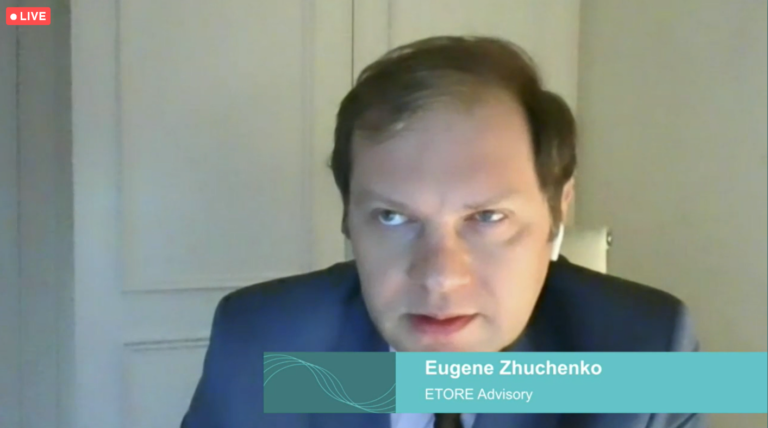
“It gives investors the ability to steer portfolio construction in a more coherent way,” said Eugene Zhuchenko, founder of ETORE Advisory, which was involved in the establishment of the first pledge fund structure in the grand duchy. “Sometimes a blind pool fund is not what investors expect. There is a risk of strategy drift, and of opportunistic investments to boost returns that could involve higher risk.”
For managers, says Arjun Infrastructure Partners’ Serkan Bahçeci, pledge funds offer the opportunity to work more closely with investors and gauge their deal appetite, although he acknowledges that it requires they have the resources and time to assess each proposed investment. And Allen & Overy partner Jean-Christian Six notes that it demands the ability to track the exposure of each investor to their particular underlying assets.
Pledge funds promise to become a new addition to Luxembourg’s alternative fund toolbox, which already offers a wide range of options, says Clifford Chance Luxembourg partner Paul Van den Abeele. He notes that whereas historically the jurisdiction was the domicile principally of main fund vehicles, today managers are also using it for securitisation, co-investment, carried interest and sidecar discretionary co-investment vehicles.
The SFDR as game-changer
US-based global real estate manager Hines has appreciated the options offered by the grand duchy for more than a decade, says tax director for Europe Paul Taylor, noting that the $144 billion group has as many as 30 regulated and unregulated structures and around 150 special-purpose vehicles in Luxembourg. He said: “We have been focused on Luxembourg for a long time because of its flexibility and the quick time to market for unregulated vehicles.”
Next March, the Luxembourg fund industry faces the start of reporting under the EU’s Sustainable Finance Disclosure Regulation. Said Linklaters partner Hermann Beythan: “It is a game-changer that goes to the heart of private equity and real estate – what funds invest in and why. Managers will have to examine not just the impact on their processes but the value of their investments, such as buildings located on a shoreline.”
Fidelity International’s head of EU public policy, Natalie Westerbarkey, says the real estate sector has a wide range of avenues for making its assets more sustainable, including renovation and retrofitting of buildings, tenant engagement and involvement in international industry initiatives. “There is a lot of awareness of environmental and social issues in Europe, but there is scope for improvement elsewhere in the world, especially in Asia,” she said.
Open architecture model
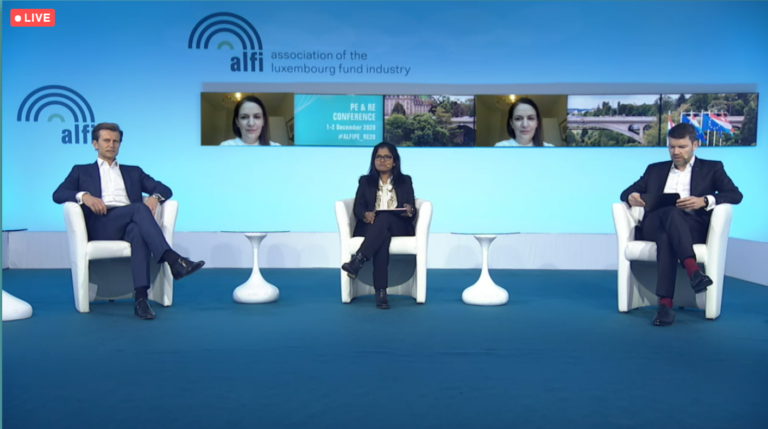
Industry members are also preoccupied by the ongoing European Commission review of the Alternative Investment Fund Managers Directive. Arendt & Medernach partner Claude Niedner argues that the push by the European Securities and Markets Authority for closer regulation of portfolio management delegation to non-EU jurisdictions should not put at risk the global competitiveness of the AIFMD regime: “Do we want to keep an open architecture model, or European funds with European managers for European investors and European assets? We should not try to fix what isn’t broken.”

At the same time, they are sifting the issues thrown up by the Covid-19 pandemic and the successive economic lockdowns. Jeff Rupp, director of public affairs for industry body INREV, says the pandemic has accelerated existing trends, such as the increasing importance of the logistics sector and rising investor interest in debt funds. But he warned there may be further consequences to come as ‘normality’ returns: “With a surge in public borrowing and pressure on EU countries to raise more revenue, real estate may represent an easy target.”
Sven Olaf Eggers, CEO of Stuttgart-based real asset fund manager AIF, says this year has brought home that digitalisation is not a panacea in itself, but a means to an end. “We need not just data but correct data, and interfaces for the interaction of portfolio and risk management. The fact that high street retailers with apparent sound business models and ratings are going bankrupt demonstrates the need for smarter data.”
Interested in sustainability, finance, and the funds sector? We think you’ll like:

